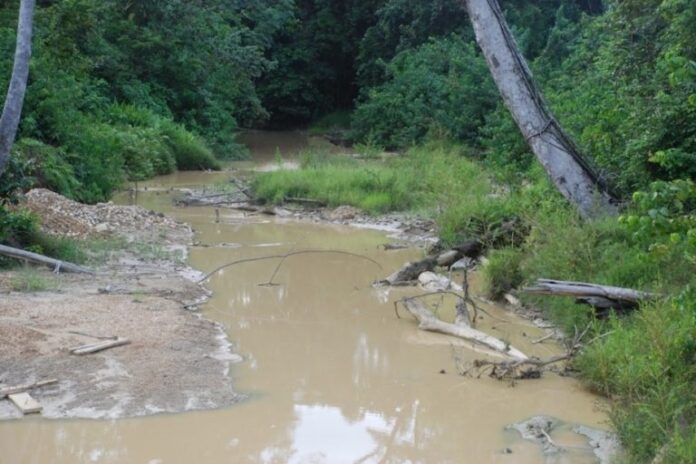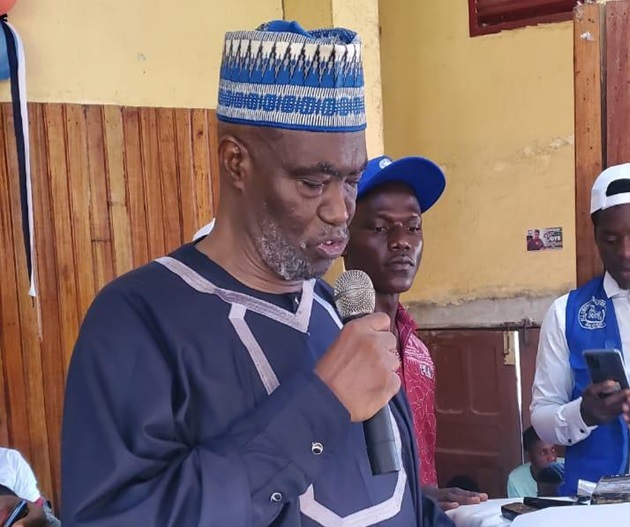By Varney Kamara
The waterways that frame the town of Sam Beach in Liberia’s Rivercess County once served as a lifeline for local people, providing them with fish as well as clean water for drinking, cooking and washing.
But that was decades ago.
Today, more than 1,000 gold diggers, six licensed mining concession holders, three brokers and two large-scale mining companies — S & K Mining Corporation Limited and Gbarwor Mining Cooperative Society — are tearing up forests and rivers in search of gold.
Artisanal gold diggers encroach on surrounding forests in their hunt for rich mining pits, exposing communities to ecological disaster. In the heart of populated settlements, earthmoving equipment is used to dig mine pits, endangering the safety of more than 3,000 villagers. And the river the village once depended on is muddy and shows no sign of life within it.
“We cried for development, but they came and have dirty our water,” says Esther Zangar, a former fisherwoman. “We no longer fish, drink and cook with it.”

A mixed blessing
Liberia, a West African state of 5.3 million people, is blessed with an abundance of mineral resources, including gold, diamonds and iron ore.
On paper, polluting waterways is regulated by both the mining and environmental management laws of 2002, which set sanctions for acts that threaten the environment, public health and wildlife. Companies guilty of violating these provisions can face fines of up to $50,000, or imprisonment of up to 20 years, in addition to the seizure and impoundment of their materials.
In November 2019, the Liberian government banned the use of dredges and mercury for gold and diamond mining, after huge public outcries that the country’s rivers were being contaminated with mining waste, their waters silted and banks and riverbeds damaged by mechanical dredging.
Liberia is also a signatory of the Minamata Convention, a global treaty aiming to reduce mercury pollution, which poses threat to both the environment and humans.
However, enforcing these restrictions has proven difficult. Violations are taking place nationwide, according to an assessment by the Social Entrepreneurs for Sustainable Development (SESDev), a nongovernmental organization that advocates for the fair distribution of natural resources. MineHutte, which rates and analyzes natural resource risks, says these measures are under-developed, providing only the “bare bones of a mining law regime.”
The Ministry of Mines and Energy, the entity responsible for regulating the sector, struggles to keep up. Almost 70% of ministry workers are volunteers. This is compounded by capacity issues such as lack of GPS and vehicles for regular inspections, as well as the fact that many of the country’s mining sites are in remote and often inaccessible areas.
“We have only six motorbikes for the six mining regions across this country,” J. Obediah Arku, inspector general of mines, tells Mongabay. “In order to have the law fully enforced, this ministry needs between $6 million and $7 million.”
These factors, coupled with limited funding, have largely rendered the monitoring of Liberia’s mining industry ineffective.

“I don’t have the power to stop it”
Sam Beach reflects the broader challenges facing the country’s gold mining regime. Located in the Kploh district, 490 kilometers (305 miles) southeast of the capital Monrovia and deep inside forests traditionally belonging to the Teekpeh and Ziadue clans, the camp provided refuge for thousands of internally displaced Liberians during the country’s civil war.
Today, large-scale, poorly regulated mining has resulted in the destruction of forests and waterways, and with it the livelihood of residents.
“There is no money here, and things are very hard,” says Zangar, the fisher. “I used to make money from laying baskets on the river. At that time, I would use the money to pay my children school fee, buy clothes for myself and feed my home.”
Community forests close to the camp have been peppered with holes by miners who carve out deep and rounded pits without replenishing or refilling the soil.
Mere meters away from the makeshift houses that make up the settlement of Sam Beach, workers for Gbarwor use earth-piercing machines to penetrate several meters deep into the ground, risking the gold camp to a potential mudslide.
Mongabay observed men working with front-end loaders in the forests behind the camp’s poorly constructed buildings. The workers, a mix of Liberians and other West Africans, are divided into groups several meters long north-west of the camp.
Signs of rivers and creeks being contaminated can plainly be seen along the road connecting Zami Town to Sam Beach. The rivers and creeks in the area appear practically dead, so muddy, dirty and filled with sediment the water can’t be seen through. Open mining pits are scattered in the forest fringing the gold camp, exposing villagers to “boogie holes” or death traps.
Mining here operates in community forest land customarily owned by the Ziadue and Teekpeh clans. The 2009 Community Rights Law recognizes traditional landowners’ rights to manage their forest resources, but the mineral and mining law of Liberia, which the government uses to sign mining agreements, does not. But local people say they have been excluded from contract negotiations.
“We do not have any part to do in the agreement; the people only come here and tell us what they have for the community when they finished signing the contract with the government,” says James Geeyon, clan chief of Ziadue Clan. “I usually feel bad about this, but I don’t have power to stop it.”

Hardships and social consequences
The camp is estimated by mining authorities to produce several thousand ounces of gold annually, each currently worth around $1,700 on the global market. But there are no commensurate development indicators pointing to this boom. The camp still lacks schools and health care facilities.
“There are over 200 children in this town who are not in school. This is one of our biggest worries here,” says Teddy G. Nelson, town chief and camp master of Sam Beach. “I am worried about the kids’ future. We want the government to help build a school here for our children.”
In Zami Town, 2 kilometers (1.2 miles) from Sam Beach, the Kploh district’s only health center is struggling to cope with an influx of patients who complain about the effects of pollution.
“Most patients we treat here complained about drinking dirty water. They are drinking from rivers and creeks that have been polluted by gold miners,” says Emmanuel Zaizay, officer in charge (OIC) at the clinic.
Djomba Mara, artisanal and small-scale mining consultant of the Mano River Union (MRU), says that better equipping and regulating small-scale miners would help both small operators and the environment. “The short-term solution is to push greatly for the formalization of the artisanal and-small scale gold mining sector,” he says. “The medium- and long-term solutions would be to provide alternative answers to using toxic substances by providing unit plants machines that wash gold without using mercury or cyanide.” Source: news.mongabay.co







